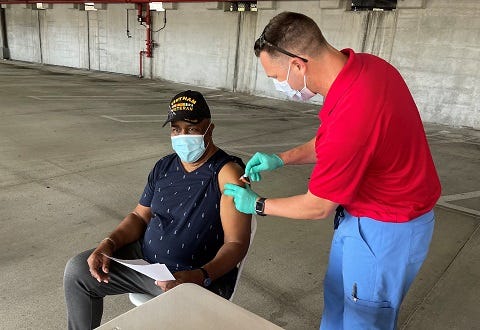
Inconsistent documentation means the Department of Veterans Affairs was unable to track whether some of its most vulnerable veterans were vaccinated against COVID-19, and what the reason may be if they weren't, a new watchdog report shows.
The VA Office of the Inspector General found that the lack of documentation left the department without clear information on whether or not roughly a quarter of its nursing home residents received the vaccine and whether they did not receive it because of health concerns or refusal or because they had not yet been offered one.
VA nursing home staff told investigators that they either entered the vaccination information into the incorrect system, or they did not record it at all, and at the time of the inspector general's review, there was no national guidance for VA staff on tracking reasons why a veteran was not vaccinated.
Veterans in VA's 132 nursing homes, also known as community living centers, or CLCs, are among the highest priority groups for vaccines, but the inspector general's report shows that the overall vaccination rate for those residents was about 60% as of early January, including at least one nursing home that had no documented vaccinations. At least three nursing homes had vaccination rates of about 20%.
"Because CLC residents are in the highest-priority COVID-19 vaccine group, they should be offered the vaccine, when possible, before other groups of veterans," according to the report. "This information is especially important considering VHA has faced restrictions on the amount of vaccine available."
As of Jan. 19, the report showed that there was no documentation to show that 1,899 veterans in VA nursing homes -- about 23% -- had received vaccinations, or if they did not, what the reason may be.
"The vaccination rates increased nationally and at individual (nursing homes) during January as VHA started administering more of the vaccine ... However, the OIG determined that VHA could not know at a national level whether the vaccine was offered to some (nursing home) residents and, if so, what their status was," the report reads. "At a national level, VHA did not know why these residents had not been vaccinated or what proportion had not been offered the vaccine."
VA officials responded to the report, saying that more than 90% of department nursing home residents had received "at least one dose of a COVID-19 vaccine," as of Feb. 15, 2021. But the inspector general's report warned that because of poor documentation, that number may be unreliable since they "may be undermined by inconsistencies in how vaccination refusals, contraindications, deferrals, and other statuses are recorded for incoming, outgoing, and existing CLC residents."
Of the 5,887 residents living in VA nursing homes, 5,299, or 90% had received at least one dose of the vaccine, VA spokeswoman Susan Carter told Connecting Vets Wednesday.
"VA is grateful the OIG acknowledged its strides in rapidly distributing COVID-19 vaccines to CLC residents. OIG made no specific recommendations for improvement but noted opportunities for improvement in data collection," Carter added, echoing VA Acting Undersecretary for Health Dr. Richard Stone's response included in the report. "VHA will identify and evaluate gaps in documentation of CLC-provided vaccines and develop a corrective action plan to improve tracking of COVID-19 vaccination data."
Read the full report.
—
Reach Abbie Bennett: abbie@connectingvets.com or @AbbieRBennett.
Sign up for the Connecting Vets weekly newsletter to get more stories like this delivered to your inbox.



